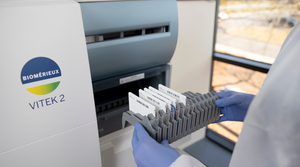Unmet Needs: Inspiration for Medtech Inventors
Physician inventors discuss what they see as the greatest unmet needs in pediatrics, cardiology, gastroenterology, and more.
November 6, 2015

Physician inventors discuss what they see as the greatest unmet needs in pediatrics, cardiology, gastroenterology, and more.
Marie Thibault

In a popular, packed session at this week's MD&M Minneapolis conference, three physician inventors talked about their successes and failures in developing medical devices. Their expertise led to a discussion of what they see, as doctors and innovators, missing from the field.
The diverse panel, which included a pediatric specialist, a gastroenterologist, and a cardiologist, rattled off a list of unmet needs.
"I could go on all day about pediatric needs because it's an area that's about 10 years behind adult technology, so there's a lot of work to be done," said Gwenyth Fischer, MD, founder and director of the Pediatric Device Innovation Consortium and pediatric critical care physician at the University of Minnesota Children's Hospital.
Fischer says that one major opportunity for innovation is bringing hospital-quality technology into the home. "We have a lot of chronic kids who previously weren't surviving but now, thanks to great NICU technology, they're making it out and getting home. Those kids have trachs [tracheostomy tubes], they have ventilators, they have shunts that are in their heads. They have a lot of care that currently occurs in the hospital that is expensive and could be moved to the home," Fischer said.
Robert Ganz, MD, chief of gastroenterology at Abbott Northwestern Hospital, said that gas, constipation, diarrhea are all big unmet needs in his space. He said he expects much more exploration and therapies related to the microbiome in the future, since it has linkages to health problems like obesity, diabetes, food allergies, digestive problems, and more. "That's probably the biggest opportunity in GI today, is assessing the microbiome," Ganz said.
Obesity has implications for the pediatric population too. Fischer explained, "We don't have pediatric beds that are able to handle obesity right now. We don't pediatric lifts like they do in the adult hospital. Critically ill obese pediatric patients are not able to be turned the way they need to, which then leads to bed sores and other problems . . ."
Robert Schwartz, MD, FACC, FAHA, FSCCT, medical director at the Minneapolis Heart Institute Foundation, said he believes there is a need for better real-time understanding of the body's autonomic system in order to create a variety of new therapies. He acknowledged the recent disappointment of renal denervation, but said, "who would have ever thought you could just put a catheter in there blindly and burn and think that you had in fact burned all of the nerves that are there?"
"I think virtually every organ that has virtually any homestatic function is under autonomic control, and I would argue that there's a big need to understand what is going on from the autonomic standpoint as it relates to homeostatic control of multiple organs across the body," Schwartz said.
These panelists said their roles as physicians are a key part of also being able to invent new medical technologies. "If I wasn't seeing patients, I wouldn't be able to do the innovation part, because you have to get the ideas and you have to know where the issues are," Ganz said.
"My best ideas and my best products have come from individual patient experiences. The best way to keep your passion about something is to remember the kid that died because they didn't have that product that you're working on," Fischer said.
Check out the future of medical technology—register for the BIOMEDevice San Jose Conference, December 2-3, 2015. |
Marie Thibault is the associate editor at MD+DI. Reach her at [email protected] and on Twitter @medtechmarie.
[Image courtesy of SCOTTCHAN/FREEDIGITALPHOTOS.NET]
About the Author(s)
You May Also Like

